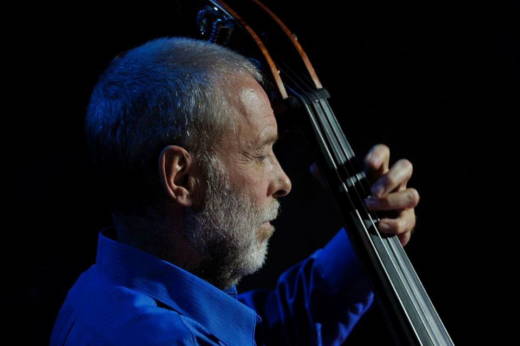At 71, the British-born Holland has been a creative force for more than half a century, and a vanguard figure since he arrived in the United States in 1968 to play with trumpet legend Miles Davis, who wanted an electric bassist for his rapidly evolving band. Holland long ago shed the electric bass from his arsenal, and he’s one of a handful of jazz double bassists resourceful enough to turn a solo evening into a riveting musical experience.
San Francisco native Barre Phillips released the first solo jazz bass album in 1968, a project known under various titles, including Journal Violone. But it was Holland’s 1977 album Emerald Tears (ECM) that brought the demanding format into jazz’s mainstream (fittingly, Holland and Phillips recorded a duo album together, 1971’s ECM session Music For Two Basses). His history with the format spans his peripatetic creative journey from his years in the avant-garde quartet Circle with Chick Corea, Barry Altschul, and Anthony Braxton, through his embrace of compositional form and groove as a bandleader some two decade later.
“Anthony Braxton encouraged me to do more solo playing,” Holland says. “But I didn’t really do my first solo concert until Emerald Tears. When you think about the bass, you can play double stops and some chordal things, but you have to present the whole song. When I started playing cello in 1970 I worked on those amazing Bach solo suites, and that’s what used to develop a solo bass approach too. Bach presents a way to accompany, fulfill the harmonic setting and play melody at the same time.”
For Friday night’s show, Holland is joined by pianist and fellow NEA Jazz Master Kenny Barron, a duo that embodies jazz’s interactive imperative at its more rarified. They first played together on Barron’s 1985 trio session Scratch (Enja), and in the years following, whenever their paths crossed, they talked about working together again. Decades later, they finally seized the moment, resulting in the duo album The Art of Conversation (Impulse!), which was named 2014 Album of the Year by the Jazz Journalists Association.
As befitting an improviser whose lines flow with elegant, curvilinear grace, Holland adds a player over the course of each night. Saturday’s trio reunites Holland with guitarist Kevin Eubanks, with whom he’s collaborated since the 1980s, and SFJAZZ Collective drummer Obed Calvaire, a more recent connection. Holland caught Calvaire playing on a gig with Cameroonian bassist/vocalist Richard Bona a few years ago, and sought him out. Holland and Eubanks had been in the midst of creating new music after the guitarist left his long-running television gig with Jay Leno, and they added Calvaire into the mix, a trio they’re in the process of recording.
The run closes on Sunday with Aziza, Holland’s quartet with tenor saxophonist Chris Potter, drummer Eric Harland, and Beninese guitarist Lionel Loueke (who was just in town with Herbie Hancock a few weeks ago). “Talk about a unique guitarist!” Holland says. “I’m so lucky to have this relationship with two amazing guitarists, Kevin and Lionel. The way Lionel relates to a band and accompanies brings such an amazing dynamic to a group.”
Holland returns to the SFJAZZ Center on June 16 as part of the 36th San Francisco Jazz Festival for a trio concert with Chris Potter and Zakir Hussain, who built last year’s India-jazz summit Crosscurrents at SFJAZZ around Holland’s bass.
Crosscurrents has toured widely since then, but this date is a stripped-down situation “so we can get into deep waters with Zakir and his rhythmic world,” Holland says. “He’s such a supportive player. But still, it’s so challenging to play with him, with his incredible ability and depth, combining all the Indian tradition and his experience working with all his collaborations. It’s something very special.”
But that’s a whole other conversation.

Dave Holland’s residency at SFJAZZ runs March 22–25. Details here.



